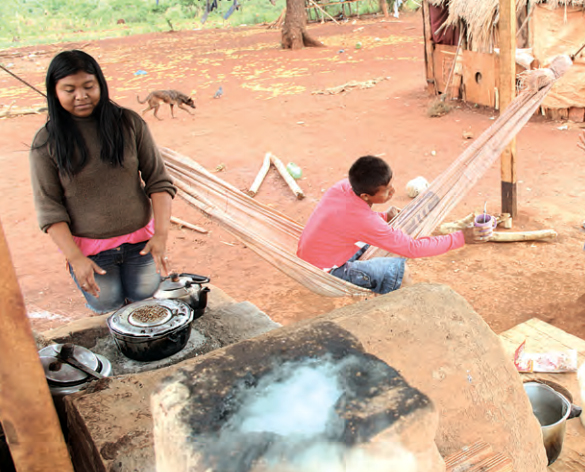

Eco-stoves empower Brazilian women

By Daniel de Castro and Jacob Said
The sun was still rising and Delma Gonçalves, 41, had already spent two hours trekking to the place where she and the rest of her settlement collected firewood. The return trip was even worse: under the hot sun, she carried a bundle of wood weighing 20 kilogrammes on her shoulder.
Gonçalves is a member of the Kaiowá Guarani indigenous people, Brazil's second largest indigenous group, who live in the area of Panambizinho, 250 kilometres from the capital city of Mato Grosso do Sul state in west-central Brazil. Three times a week, for many years, this has been Gonçalves’s morning routine.
“I had a really sore back. I would get home so tired that I couldn’t find the energy to cook,” says Gonçalves. Every day she would make the fire for lunch on the floor, using a few cans to protect it from the wind and a refrigerator cooling coil as an improvised grill.
In addition to worsening her back pain, the floor fire filled the house with smoke, hurting the health of Gonçalves’ children, who suffered from respiratory problems like asthma, pneumonia and bronchitis. But all this has started to change with the arrival of high-efficiency wood stoves that have helped to transform the lives of dozens of indigenous families in Panambizinho.
The technology to construct these so-called “eco-stoves” was developed by a group of Brazilian non-governmental organizations through a UNDP project promoting low-cost and green energy access in Brazil’s semi-arid northeast. It is currently being adapted to serve the needs of the Kaiowá Guarani people in the Brazilian tropical savannah. In contrast with traditional wood stoves constructed with materials like cement and iron, this new stove uses low-cost materials that are found in the region, like mud, sand and clay.
The UNDP initiative is part of an MDG-F joint programme to promote food and nutrition security within indigenous communities, especially for women and children. In all, the project potentially benefits about 53,000 indigenous people across the country, both directly and indirectly. The stove has been considered a model for sustainable technology and will hopefully be used in other similar projects across the globe, a major goal of the programme.
Benefits of Eco-stoves
The stove’s materials and design help to retain heat longer; a special clay plate over the fire acts as a barrier to energy waste and conducts heat better. As a result, the plates stay hot for up to five hours, even after the fire has gone out, making it easier for people to cook food without constant supervision.
Thanks to the new stove, the health of everyone in Gonçalves’ family has improved, especially that of her children who, in addition to eating better, now have fewer respiratory problems. The new stove uses a chimney to keep the house well-ventilated and removes smoke and other by-products. The environment also benefits from such stoves, since they produce significantly less greenhouse gasses due to a more efficient use of firewood.
The stove’s high energy efficiency makes it possible to use thin twigs, dry leaves, corn shucks and bark as fuel, all products that are easy to find around the yard, where families generally plant gardens and trees. One of the aims of the project is to encourage families to stop using heavy firewood. Lighter and smaller wood is readily available around the house, and diminishes the environmental impact on nearby forests.
Gonçalves’ long journeys to look for wood have ended. She now goes to her backyard to pick up small branches that have fallen from trees.
“I use my extra time to take care of my kids and the house. I weed the yard, do the laundry and sweep the porch. I also take care of the garden,” she says as she drinks her tereré, a traditional yerba maté drink from the region.
Fire has spiritual significance for the Kaiowá people: it is a synonym for purification. Generally, fire is controlled by women, whose role is to unify and feed the family. Around the fire -- now sustainable and health -- Gonçalves and other indigenous women in Panambizinho nourish not only their families’ daily needs but also a long-respected tradition.
Improving life for Brazil's indigenous people
The MDG-F is working to improve conditions for indigenous people in Brazil, where four out of ten Indians live in extreme poverty and more than half the children are anemic. The Eco-stoves initiative is part of the joint UN programme "Promoting Food Security and Nutrition for Indigenous Children in Brazil", a collaboration between the Brazilian government and five UN agencies (WHO, UNDP, ILO, UNICEF and FAO) to improve food security and nutritional status of native populations in the areas of Dourados and Alto Rio Solimões.